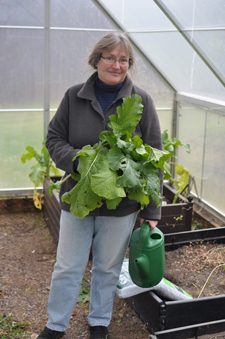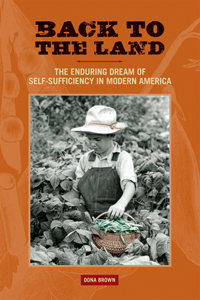Back to the Land
The Enduring Dream of Self-Sufficiency in Modern America
Dona Brown
Studies in American Thought and Culture
Paul S. Boyer, Series Editior
Best Books for General Audiences, selected by the American Association of School Librarians
“What a splendid account of a movement that’s usually
caricatured. It taught me a lot about my state of Vermont,
but also about the political and committed history of
back-to-the-landers across American history. Forget your
stereotype of the rugged individualist: this story turns out
to be a lot more interesting than that!”
—Bill McKibben, author of Earth: Making a Life on a Tough New Planet
For many, “going back to the land” brings to mind the 1960s and
1970s—hippie communes and the Summer of Love, The Whole Earth
Catalog and Mother Earth News. More recently, the movement has
reemerged in a new enthusiasm for locally produced food and more
sustainable energy paths. But these latest back-to-the-landers are part
of a much larger story. Americans have been dreaming of returning to
the land ever since they started to leave it. In Back to the Land, Dona
Brown explores the history of this recurring impulse.
Back-to-the-landers have often been viewed as nostalgic escapists
or romantic nature-lovers. But their own words reveal a more complex
story. In such projects as Gustav Stickley’s Craftsman Farms, Frank
Lloyd Wright’s “Broadacre City,” and Helen and Scott Nearing’s quest
for “the good life,” Brown finds that the return to the farm has meant
less a going-backwards than a going-forwards, a way to meet the challenges
of the modern era. Progressive reformers pushed for homesteading
to help impoverished workers get out of unhealthy urban
slums. Depression-era back-to-the-landers, wary of the centralizing
power of the New Deal, embraced a new “third way” politics of decentralism
and regionalism. Later still, the movement merged with environmentalism.
To understand Americans’ response to these back-to-the-
land ideas, Brown turns to the fan letters of ordinary readers— retired teachers and overworked clerks, recent immigrants and single
women. In seeking their rural roots, Brown argues, Americans have
striven above all for the independence and self-sufficiency they associate
with the agrarian ideal.
 Dona Brown is associate professor of history at
the University of Vermont and author of Inventing New England: Regional Tourism in the
Nineteenth Century.< Dona Brown is associate professor of history at
the University of Vermont and author of Inventing New England: Regional Tourism in the
Nineteenth Century.<
Praise:
“Brown's deep understanding of one region strengthens the book and allows her to explore beyond it with confidence.”
—Journal of American History
Media & bookseller inquiries regarding review copies, events, and interviews can be directed to the publicity department at publicity@uwpress.wisc.edu or (608) 263-0734. (If you want to examine a book for possible course use, please see our Course Books page. If you want to examine a book for possible rights licensing, please see Rights & Permissions.)
|
|

June 2011
LC: 2010038899 HT
296 pp. 6 x 9 21 b/w illus.
"A compelling work of extraordinary
richness — a singular quilt of Americana concerning
those who lived the ever-changing
back-to-the-land movement and those
who wrote about it as well. Cultural and
agricultural history are happily wed here.”
“A useful corrective to the idea that the country living movement is strictly an effort to get right with Mother Earth.”
—The Wilson Quarterly Autumn 2011
|
 Dona Brown is associate professor of history at
the University of Vermont and author of Inventing New England: Regional Tourism in the
Nineteenth Century.<
Dona Brown is associate professor of history at
the University of Vermont and author of Inventing New England: Regional Tourism in the
Nineteenth Century.<